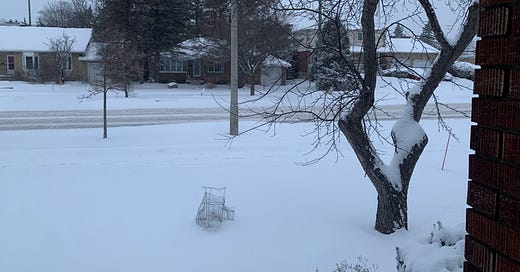the green notebook,
, reading Sara Power, David O'Meara + Anselm Berrigan, with shades of Michael Ondaatje, Miriam Gershow + Miranda Hill,
Ottawa fiction writer Sara Power came by the other morning, hand-delivering a copy of her debut short story collection, Art of Camouflage (2024). We were trading collections. She slipped into our driveway just as I was attempting to convince Aoife into socks, into snowpants, for that slow four hundred metre walk to school. Now that I’m finally starting to go through the collection, I notice that there is something here reminiscent, at least in my reading, of Oregon writer Miriam Gershow’s Survival Tips: Stories (2024), or even Hamilton writer Miranda Hill’s Sleeping Funny (2012), through an adherence to a sequence of direct and grounded narratives. “Years ago,” Power writes, as part of the story “IN THE SKIN OF A LAMB,” “I was fascinated by an article in The Guardian that revealed new information concerning the death of famous militant suffragette Emily Wilding Davison. Davison died from her injuries after being trampled by King George V’s horse during the 1913 Derby, and over the course of time, history had its way with her. She was a suicidal radical. She was confused and didn’t notice the barrage of horses barrelling toward her as she traversed the track. Please.” I appreciate Power’s narrator moving not only through the action of her day but her reading, allowing her thinking equal weight to anything else that occurs.
The title of this particular story, of course, is a play off the title of Michael Ondaatje’s novel In the Skin of a Lion (1987), a novel that held the infamous The English Patient (1992) as its sequel, which itself was not only awarded the Booker Prize, but was adapted into a multiple Academy Award-winning feature film. Ondaatje borrowed the phrase “in the skin of a lion” from the Epic of Gilgamesh (c. 2100-1200 BCE), the classic epic poem that emerged from ancient Mesopotamia. Winfried Siemerling, in his “Oral History and the Writing of the Other in Ondaatje’s In the Skin of a Lion” (2004) writes:
The passage evokes the novel’s title and its first epigraph, taken from the Epic of Gilgamesh: “I will let my hair grow long for your sake, and I will wander through the wilderness in the skin of a lion.” (93) In the epos – the story of a double – Gilgamesh abandons his way of life after the death of his friend Enkidu, with whom he has transgressed the laws and the boundaries determined by the gods, in order to immortalize his name.
Power, through her narrator of this particular story, offers elements of the double, of multiple; offering different facets of her narrator for different situations, different interactions, whether alone with her thoughts, or with unnamed husband, father, daughter. As well, the narrator of Power’s story speaks of her “profound worship of Russian émigré Paraskeva Clark,” the well-known Canadian painter who made a name for herself after landing in Toronto in the early 1930s. I’m intrigued by this particular description, as Power writes: “In her 1956 painting Mother and Child, a young woman sits at a table, holding a sleeping child. The woman rests her head in her left hand, a glass of tea within reach. Books and artists’ tools litter the table, and an empty chair sits in the foreground. For whom or what is this vacant chair, I wonder, her dead husband or her infinite yearning?” To know one, perhaps, is to recognize the other.
I appreciate Power’s play off the Ondaatje title, having done my own versions, riffing my own short story, “The Man from Glengarry” in On Beauty, off Ralph Connor’s 1901 novel of the same name. With a century between us, a flicker of that Scottish settler-mentality of Connor’s Glengarry still held during my own era, as he writes in the book’s preface: “In the Canada beyond the Lakes, where men are making empire, the sons of these Glengarry men are found. And there such men are needed. For not wealth, not enterprise, not energy, can build a nation into sure greatness, but men, and only men with the fear of God in their hearts, and with no other. And to make this clear is also a part of the purpose of this book.” There are such curiosities as can be discovered, even across the distance of time in this small corner of eastern Ontario. There is also my more recent short story, “The snows of Mount Yamnuska,” set as part of the manuscript of “Very suddenly, all at once,” attempting to play with some of the structures of Ernest Hemingway with a Canadian reference, playing off the title of his 1936 story, “The Snows of Kilimanjaro.” Books come from books, after all, and writing can’t help but echo incorporated elements, so why not offer those references, those influences, as actual play?
*
Our English-language Ottawa poet laureate, David O’Meara, composes a poem that responds to the current housing crisis, specifically around last week’s death of a homeless man on Elgin Street. The utter insanity, given we’re one of the wealthiest countries in the world. There shouldn’t be homelessness, or food insecurity. There shouldn’t be a housing crisis, or healthcare shortfalls. There shouldn’t have to be ‘boil water’ advisories that last into years. There shouldn’t be such poverty, such death. Or an Ontario Premier that prioritizes corner-store beer sales over hospitals, healthcare. As O’Meara’s poem, “Winter,” ends: “He died in / a doorway, his home a thin / sleeping bag in a city of rooms.”
Separately, from the opening lines of Brooklyn poet Anselm Berrigan’s BROKEN FILTER (2024):
One result of being self—the reach
to stitch us all together.




